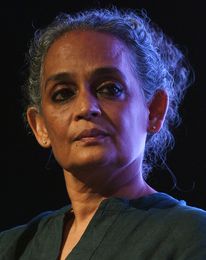The hounding of Arundhati Roy may well turn out to be one more of those own-goals our rulers are growing to be famous for. Perhaps, the thinking is that it will make them look ‘stronger’—like they haven’t lost their iron grip on the minds of this nation and are still very much in control of what we read, think, eat, worship or whom we love.
But cracking down on the OG rebel who taught us all that it is sometimes okay to ‘break the love laws, the laws that lay down who should be loved. And how. And how much’ is perhaps not a good idea. All it may end up doing is make Roy, 62, relevant to the free-thinkers amongst Gen Z who, though familiar with the competent, well-researched, but decidedly non-libidinous lectures of Haryanvi engineer Dhruv Rathee, remain innocently unexposed to powerful seditious prose like ‘the carpenter’s hands lifted her hips and an untouchable tongue touched the inner-most part of her. Drank long and deep from the bowl of her.’ (Yes, boys and girls, that is the kind of stuff Indian writing in English was dishing out back in the swinging 1990s.)
The God of Small Things blew my 27-year-old mind, even before it won the Booker Prize, and I’m sure it will do the same to all the curious young folks who may now go looking for it, the same way they went looking for the Congress manifesto about two months ago.
Surely this is not an outcome the ruling dispensation was hoping for. But what exactly is it about Roy that gets rightwing chaddis into such a febrile twist? Is it her genes—a mix of Bengali and Malayali, both of which are states that have decidedly rejected their politics? Is it because she is beautiful as well as brilliant, which women are just not supposed to be? Is it her battleship-grey curls, her huge eyes and her extreme thinness, which make her caricatures T-shirt friendly, in the manner of Jimi Hendrix and Albert Einstein? Is it the fact that she is effortlessly feted, internationally, something that is naturally triggering to people who have just returned from screening a propaganda film like Hamare Baarah at Cannes to tepid response, in a year where Payal Kapadia—former student at the Film and Television Institute of India who led an agitation against the appointment of a subpar rightwing backed chairperson—won a Grand Prix?
I think it’s a combination of several things. Her fearlessness, her empathy, and her calm—Roy never shouts. She just speaks out undeniable, inconvenient, damning truths in a sweet, soft voice (almost reminiscent of fellow grey-curly Yogendra Yadav) wherever and whenever she is interviewed, which is increasingly going to be everywhere and often.
“In the papers some have accused me of giving ‘hate-speeches’, of wanting India to break up. On the contrary, what I say comes from love and pride. It comes from not wanting people to be killed, raped, imprisoned or have their finger-nails pulled out in order to force them to say they are Indians. It comes from wanting to live in a society that is striving to be a just one. Pity the nation that has to silence its writers for speaking their minds. Pity the nation that needs to jail those who ask for justice, while communal killers, mass murderers, corporate scamsters, looters, rapists, and those who prey on the poorest of the poor, roam free.”
editor@theweek.in


